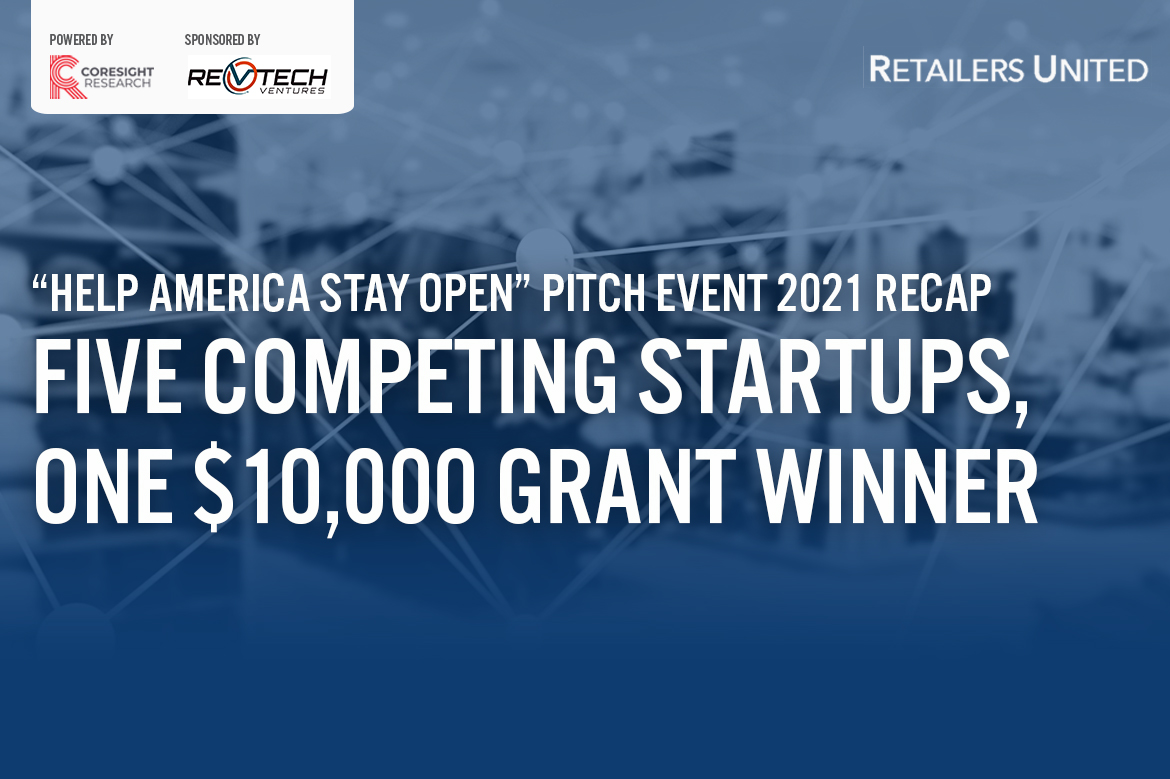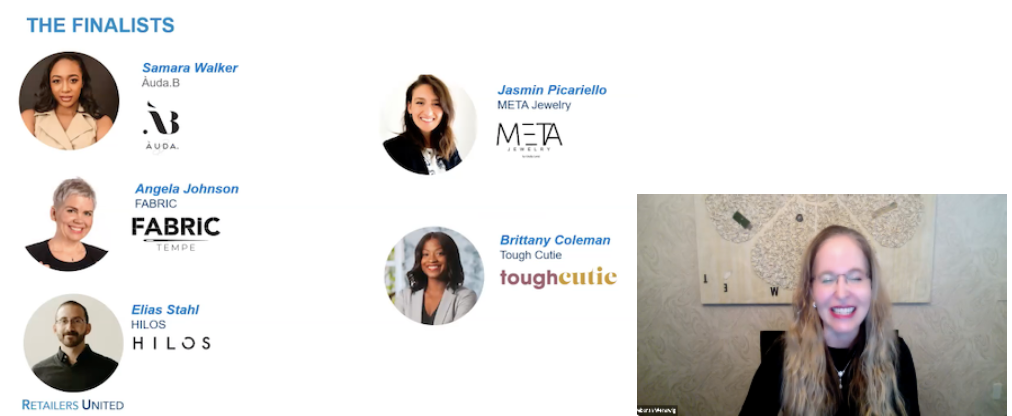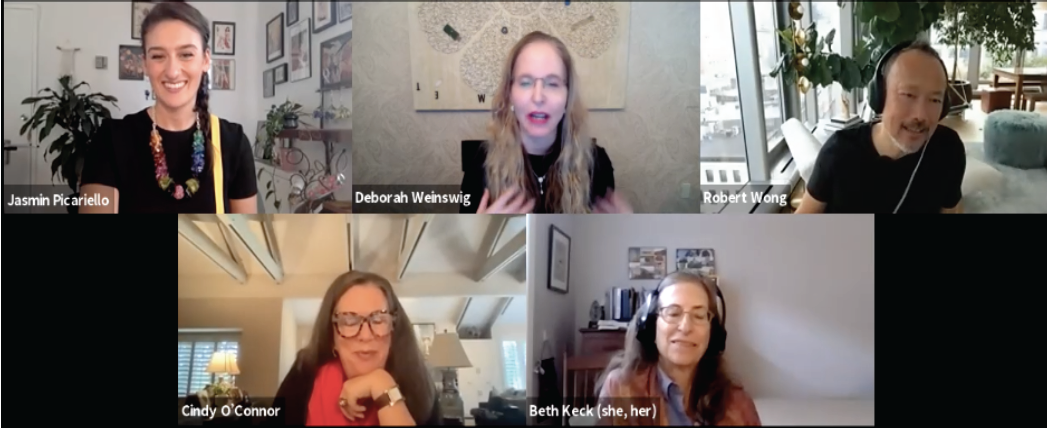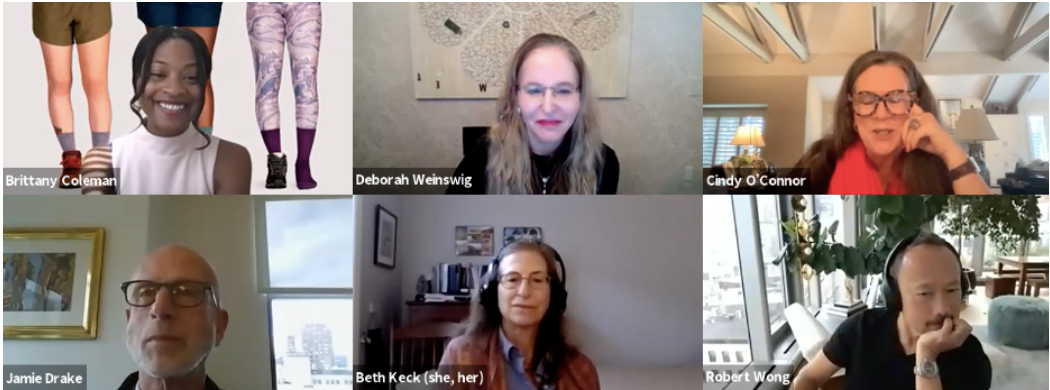
albert Chan
On October 28, 2021, Deborah Weinswig, CEO and Founder of Coresight Research, emceed Retailers United’s third pitch event, co-sponsored by RevTech Ventures. Retailers United is a nonprofit organization devoted to helping retailers navigate through the challenges facing the industry by providing financial sponsorships, services and mentorships. RevTech Ventures is a venture capital firm that invests in startups at the intersection of retail and technology.
In this report, we provide a recap of the 2021 iteration of the “Help America Stay Open” digital pitch event, with key insights from the presentations of the five startups that competed for a $10,000 grant and the opportunity to receive mentorship from industry thought leaders. We also cover highlights from a RevTech Ventures-backed company that presented while the judges deliberated.
Retailers United Pitch Event 2021: A Recap
Structure and Judging Panel
During the pitch competition, each of the five startups had three minutes to present and two minutes for a Q&A session with the judges.
The event was judged by the following retail thought leaders:
- Jamie Drake—Co-Founder of interior design firm Drake/Anderson
- Beth Keck—Distinguished Visiting Professor at Schwarzman College, Tsinghua University
- Cindy O’Connor—Former Senior Vice President, Sam's Club
- Robert Wong—Co-Founder, Google Creative Lab
Read our event preview report for more detail about each judge.
Five Competing Startups: Pitch Highlights
Following her introduction of the event, Weinswig opened the floor to the startups to begin their presentations.
- Àuda.B: A luxury vegan beauty brand bridging the gap between clean beauty, bold, and fashion-forward experiences for multifaceted beauty enthusiasts.
- FABRIC: A fashion incubator, business accelerator, design studio, academy, and manufacturer that is sustainably disrupting, redefining, and reshoring the fashion industry for the modern apparel entrepreneur.
- HILOS: A supply chain technology platform that enables brands to make circular product on-demand without inventory or waste.
- META Jewelry: A sustainable jewelry brand whose mission is to act on the billion tons of plastic that never reach a recycled state.
- Tough Cutie: An outdoor brand that makes premium hiking socks for women and is committed to supporting women.
 Deborah Weinswig, CEO and Founder of Coresight Research, introduces the five pitch competition finalists
Deborah Weinswig, CEO and Founder of Coresight Research, introduces the five pitch competition finalistsSource: Coresight Research[/caption]
We profiled these five startups in a separate report prior to the event. Below, we detail highlights from each of their presentations.
Àuda.B
Samara Walker, CEO and Founder of Àuda.B, explained that her company aims to bridge the gap between clean beauty, bold and fashion-forward experiences for the “multifaceted beauty enthusiasts” that are longing to experience beauty in a new way. She said that Àuda.B is focused on diversifying the beauty industry with products that are innovative and targeted at the minimalist looking to experience “multidimensional beauty.”
Walker emphasized inclusivity, with Àuda.B offering providing “true and authentic representation of all skin tones” and “untapping and unlocking barriers” for beauty shoppers.
As Nordstrom and Sephora are key stakeholders in the beauty industry, Àuda.B’s goal is to continue expanding its business in Nordstrom and unlock the doors to Sephora, which would allow the company to form a supply chain for its inventory that will support its future growth.
Walker acknowledged that the Covid-19 pandemic has affected its business but has also driven sustainability. She claimed that sustainability is an important aspect of Àuda.B’s culture and values, and the company understands that being resource efficient is critical for future growth.
While interacting with the judges during the Q&A session, Walker revealed that Àuda.B launched its products online with apparel specialty retailer Francesca’s a few months ago. She said that demand has been high as the pandemic has pushed customers to do more online shopping. As Àuda.B’s products did well on the Francesca’s e-commerce site, the beauty brand’s products were then rolled out in 91 Francesca’s stores—its first indoor experience.
Walker also confirmed that the company’s products were launched in Nordstrom in May 2021, and Àuda.B is getting ready to launch in six stores in Canada.
[caption id="attachment_135433" align="aligncenter" width="700"] The judging panel listen to the pitch from Samara Walker, CEO and Founder of Àuda.B (top left), in which she discusses the company’s focus on inclusivity and sustainability
The judging panel listen to the pitch from Samara Walker, CEO and Founder of Àuda.B (top left), in which she discusses the company’s focus on inclusivity and sustainabilitySource: Coresight Research[/caption]
FABRIC
Angela Johnson, Co-Founder of FABRIC, described the fashion industry as a $2 trillion global market that is “largely made up of big brands that manufacture large quantities of generic clothing in an unsustainable manner overseas and is guilty of human and environmental exploitation.” She stated that the industry is not set up for startup apparel entrepreneurs looking to fill the gap in the marketplace, and it is facing supply chain disruptions.
Johnson explained that customer interest in how and where products are made is growing, which is beneficial for entrepreneurs. However, they still face challenges in getting products manufactured due to the financial resources and expertise required.
FABRIC was created to make a change and democratize fashion, offering a road that will enable apparel entrepreneurs to navigate obstacles. Johnson said that through FABRIC, apparel entrepreneurs do not need to commit to a minimum manufacturing quantity, which allows them to make niche sewn products domestically in small batches before investing a lot of money in manufacturing in large quantities. Through the use of leading technology, which automates the process, FABRIC prepares entrepreneurs for on-demand manufacturing and makes starting a brand more obtainable, manageable, affordable and sustainable, according to Johnson. FABRIC eliminates the need for entrepreneurs to have a degree in Fashion Design or hire a full-time production manager to launch a product in the market.
As a non-profit organization, FABRIC provides scholarships to its entrepreneurs. Johnson highlighted that company’s “unique model” generates income to fund those scholarships: It rents out its space for fashion events, corporate seminars and weddings. However, during the pandemic, FABRIC turned its event space into a PPE (personal protective equipment) manufacturing factory and produced 700,000 reusable medical gowns for the healthcare industry.
[caption id="attachment_135434" align="aligncenter" width="700"] Angela Johnson, Co-Founder of FABRIC (right), tells Deborah Weinswig, CEO and Founder of Coresight Research (left), about how FABRIC supports apparel entrepreneurs
Angela Johnson, Co-Founder of FABRIC (right), tells Deborah Weinswig, CEO and Founder of Coresight Research (left), about how FABRIC supports apparel entrepreneursSource: Coresight Research[/caption]
HILOS
Eric Stahl, CEO and Co-Founder of HILOS, highlighted that of the 24 billion shoes that were manufactured last year, one in five ended up in landfill. The current process of manufacturing is not sustainable, as it is slow, expensive, wasteful and polluting, he said—and only 5% of shoes ever get recycled.
HILOS is a branded technology platform that allows retail brands to quickly launch products in the market in 90 days or fewer, manufacture products on demand, and take the product back at the end of its life for recycling. Stahl stated that the company eliminates overproduction, reduces chemical usage, saves 1,700 gallons of water for every pair of shoes manufactured, and guarantees 100% recyclability at the end of a product’s life.
HILOS launched its first product in May 2021, which was received “incredibly well,” according to Stahl, and won the company the Glossy Award for Best Breakthrough Startup. Stahl confirmed that HILOS will be launching another product in November 2021.
When asked about HILOS’s innovation and intellectual property (IP) during the Q&A session, Stahl stated that the company has innovated and patented three things: a new form of shoe making that is adapted to digital manufacturing; its new manufacturing procedures that require only three components for the company’s “Georgia” designer shoes; and its 72-hour click-to-ship service.
[caption id="attachment_135436" align="aligncenter" width="700"] Eric Stahl, CEO and Co-Founder of HILOS (top left), answers a question related to innovation and intellectual property by one of the judges
Eric Stahl, CEO and Co-Founder of HILOS (top left), answers a question related to innovation and intellectual property by one of the judgesSource: Coresight Research[/caption]
META Jewelry
According to Jasmin Picariello, CEO and Founder of META Jewelry, the company was founded in 2019 to address the problem of plastic waste that never gets recycled. She said that the company works with local coffee shops to collect and upcycle bottles into jewelry, pairing this material with silver and gold for durability and quality.
Picariello explained that sustainability is an overarching business model for META Jewelry, which engages in small production to avoid excess inventory. The company’s shipping solutions are plastic-free, and its packaging materials are recycled, recyclable or compostable. Picariello told the judges that META Jewelry is scalable; its growth potential from a supply chain standpoint is “unlimited.”
In terms of the company’s recent achievements, META Jewelry was featured on Voice of America, has partnered with online retailers such as May Trade and Uncommon Goods, and won the Emerging Brand Award at New York Now Digital Market this year.
Responding to a question about expansion beyond community, Picariello told the judges that META Jewelry is considering outreach. She said that there is potential for the company to grow beyond the community by focusing on the state (of Virginia, where the company is based) and then growing further.
[caption id="attachment_135437" align="aligncenter" width="700"] Jasmin Picariello, CEO and Founder of META Jewelry (top left), fields questions from the judges
Jasmin Picariello, CEO and Founder of META Jewelry (top left), fields questions from the judgesSource: Coresight Research[/caption]
Tough Cutie
Brittany Coleman, CEO and Founder of Tough Cutie, described the company as “the next multimillion-dollar women’s outdoor brand that combines the ethos of Athleta, the social impact of Bombas and the environmental consciousness of Allbirds.” She said that the company exists to support working women from the ground up and is committed to contributing to a world in which women have an equal footing to men in all the places they work—on the field, on the trail, in the boardroom, and everywhere in between.
Coleman emphasized that Tough Cutie is also focused on reducing its impact on the environment and uses Merino wool, a natural, biodegradable fiber that is highly durable and easy on the environment.
In terms of financials, Coleman told the judges that the company is still pre-revenue, but from a trend perspective, Tough Cutie is “at the forefront of a movement that is driving the outdoor economy forward.” According to the Outdoor Industry Association, 46% of outdoor participants in 2020 were female, up from 43% in 2019.
Coleman closed her presentation by stating that Eve, the company’s original hiker crew sock, is ready for production, and the $10,000 grand would help fund its first inventory.
In the Q&A session, Coleman acknowledged that the socks market is highly competitive but emphasized that Tough Cutie’s focus on supporting women is an important differentiator, as well as its Eve product being highly technical. She also stated that Tough Cutie plans to roll out a “buy one, give one” program that aligns with its values of giving back to women.
[caption id="attachment_135440" align="aligncenter" width="700"] Brittany Coleman, CEO and Founder of Tough Cutie, answers a question from the judges on brand differentiation
Brittany Coleman, CEO and Founder of Tough Cutie, answers a question from the judges on brand differentiationSource: Coresight Research[/caption]
RevTech-Backed ENTOUCH: Presentation Highlights
As the judges deliberated, Jon Bolen, CEO of ENTOUCH, gave a 10-minute presentation on his RevTech-backed company. Founded in Dallas, Texas, in 2008, ENTOUCH is a pioneer in smart building technology and energy management as a service. The company delivers sustainability solutions that reduce energy usage, drive profitability and simplify facility management for multisite operators.
Bolen explained that 51 billion tons of greenhouse gasses are added to the atmosphere each year. ENTOUCH’s goal is to help reduce that number to zero by 2050 in order to reduce global warming. He said that if sustainability initiatives around energy management solutions could be adopted, then greenhouse gas emissions could be reduced by 10%–20% on an annual basis. Bolen claimed that ENTOUCH offers a 200% return on investment and reduces average annual energy consumption by 15%.
ENTOUCH owns its entire technology stack and can take over heterogeneous systems and manage them from a single cloud solution.
The Winner
Kay Unger, Chair Emerita at Parsons School of Design, who is on the executive board of Retailers United and attended the pitch event to present the awards, congratulated all the startups on their participation. She also thanked the judges for their questions.
Unger announced the winner of the “Help America Stay Open” pitch event 2021 as FABRIC, presented by Co-Founder Angela Johnson.